Suyog Ketkar's Blog, page 12
March 31, 2020
Ever Neglected. Never Neglected.
The teeming thoughts.
The cavalcade of words,
Both old and new.
That, which brings me back to life anew.
The vibrant imagination.
The kaleidoscopical memory.
The artistic renditions.
That’s awarded to but few.
The waif, in this case,
The writing and the muse.
The lore, the telling, the cure.
That desperation profuse.
The simplicity. The awe.
The determination. The jigsaw.
The striking of just the right cords.
That music. Listen, dear, that’s the cue.
The perceptions. Love and geniality.
The drumming, thumping, parading reality.
Despite despair; nothing being new.
That, which comes from within, is but You.
©Suyog Ketkar
March 28, 2020
Working from Home: A Revelation
The outbreak of coronavirus has impacted millions of lives throughout the world. A lot of people and their lifestyles have experienced many changes, both big and small. For me, too, the outbreak has not only changed my place of work but a lot more than that. Yet, this post is far more than just a rant.
[image error]
Given that my new workplace is only a room away, I reach the office on time.My consumption of tea/coffee has reduced considerably.I have become better at multi-tasking.I get to choose what to suggest (and, sometimes, cook) for dinner.We have an early lunch and an early dinner. Sometimes, we skip the dinner in favor of a relatively lighter meal.I have begun experimenting with other hobbies, like writing, cooking, sketching. I even sit with my kid to draw and paint—her favorite hobby for this month.We devote some more time to our families; We speak to our parents and relatives more often. We invest extra time with them to ensure that they are safe and sound.
[image error]
The biggest revelation, however, is that it brought forth what years of married life could not: we stand by each-other. Ever since day one, it helped us rediscover, relive the feelings that became buried under a load of managing relationships, paying bills, and bringing up a kid.
February 27, 2020
How does writing make you a better person?
This post is a reply to the question someone recently put on Quora. The question was, “how does improving your writing skills help you grow as a person?“
We learn reading and writing in the early years of our lives. Like every other thing, we continue to polish it as we grow old. Despite that, only a few of us take to writing even as a daily chore, forget as a profession. Let me tell you, of the things that make us better at who we are or what we do, writing constitutes a more significant share than it currently enjoys. Here’s why I say so:
Clarity of Thoughts
Writing is tiring. First, words don’t strike. When they do, thoughts don’t always weave in perfectly. And, even if we have a smooth fabric of views, we think we do not have any new ideas to share with people around. This insecurity adds to the already long list of impediments.
We forget that we don’t share only thoughts and ideas. We share the way of sharing: the way we communicate. So long as we are clear on what we wish to express, and how to convey it, we can have an attractive style of writing. But, will this suffice? Let me bring another point.
Mental Control
You could be clear about what or how to communicate, but the moment you sit down to write, your thoughts vanish like they weren’t even there. It happens to every writer; it’s happened to me, too. The deal, here, is to hold on to the thought until you pen it down. But writing isn’t easy. It takes time and practice, both of which bring me to the next point.
Persistence is the Key
Not all great/famous writers were born with their talent. None become who they are overnight. They endure a time-taking journey before they reach an attractive piece of writing. The path isn’t easy to walk. Writers fail every day. They make little progress. There are days when they don’t proceed even a single step. Still, they continue to write every day. They choose to persist as long as they don’t end up creating likable work.
Being Someone Else
Your written work takes the reader into the world of your characters. Readers get to live someone else’s experience, at different times, amongst people not known before, and in the situations that they have never faced before. You take them there. You give them the chance to be someone else, even though for only some time. But, to be able to do that, first, you must be that someone else. You must live their life. You must undergo the same situations and face the same challenges. You must confront the same people. All of that, while sitting at your desk. While completing your daily chores. You must feel the pain your protagonist might feel at the loss of their loved ones. You must feel equally desperate to set things right before writing about it. And only then will your readers share the same feelings.
Imagine this.
You are sitting in a coffee shop. You go there every day. But, today, you are the only one in the shop. So, you get to choose where to sit. You select a chair by the side of the window.
As you sit, you realize that there is a lot that’s happening on the other side of the window. A couple is walking their baby in a pram. A hawker is calling for prospects. A man who is perched by the roadside is reading a newspaper. Another couple is walking, their hands locked. A shopkeeper is cleaning the display window. A girl on her bicycle passes by your window. Her cycle cart has a kitten who is enjoying that ride. Just then, you happen to look up to see a bird’s nest near the canopy on the porch—home to two tiny birds—in the middle of a busy street.
You are merely an observer. Yet, from that perspective, you can imagine what each one of them might be thinking—even the tiny birds that haven’t yet learned to fly.
Being someone else is that easy; being someone else is that difficult.
With that, we are back to the question. I wish you to think of all of this in totality. It isn’t easy to register the changes at such micro-levels. It isn’t easy either to feel what others feel. Or, be persistent at something even after failing at it umpteen number of times. In the long run, it does make you considerate towards others. You feel their pain. It also makes you think and weigh your words before you use them. Writing, I conclude, makes me think more, feel more, see more, and make more from every moment.
What do you think?
Product Review: Ather 450
Today, while taking a stroll around my office campus, I had a chance to ride and review the Ather 450. Although I wished to get my hands to the more exciting and sporty Ather 450X, the experience with the smaller sibling—Ather 450—was promising.
Mahesh Gaikwad, who had traveled from their Bengaluru office, assisted us with the information. Ather 450 is a battery-operated two-wheeler with a riding capacity of up to 85 kilometers (the company claims 116 kilometers), including the pillion rider. The information intrigued my colleague, Rushabh Shah, and me. So, we chose to inquire further, which lead to this post.
The low center of gravity, the 20.9Nm torque, the mono-shock suspension, and the 51:49 weight ratio give the “super scooter” a pleasant riding experience. The ride experience is on par with, perhaps even better than, the four-stroke 125CC motorcycle that I ride to the office every day.

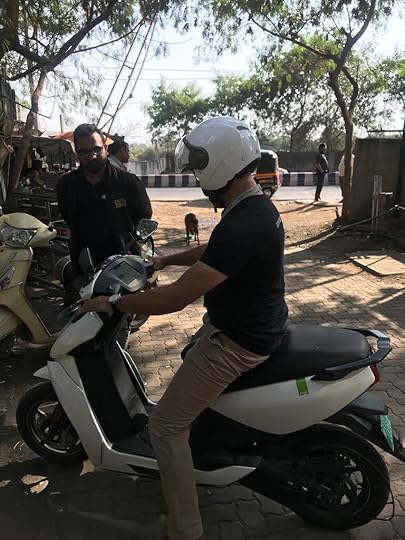
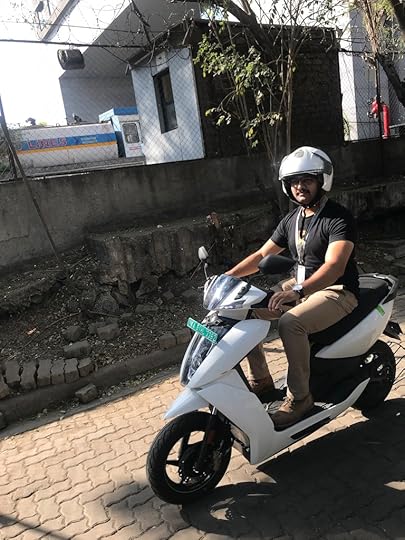

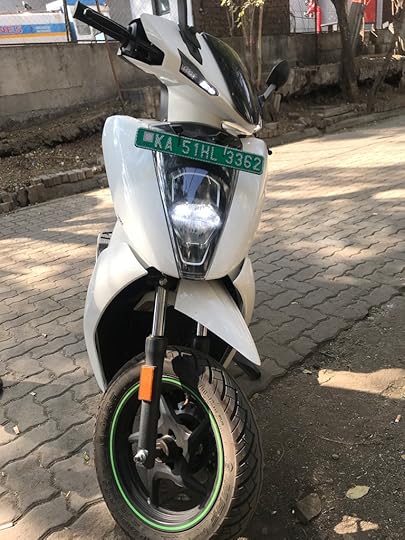
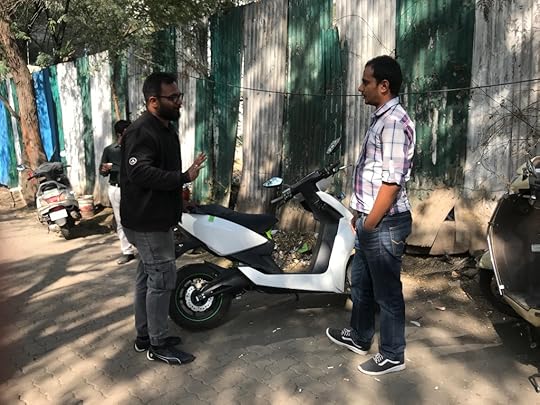
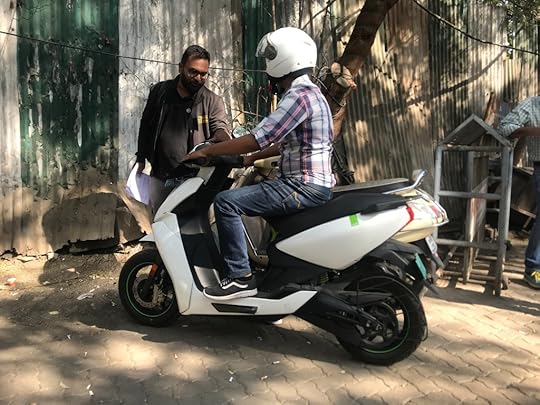



The specifications are enough, and given that the ride performance is subjective, I am sure that either version of the scooter will please most prospects.
It has 22 liters of storage capacity, which I think is ample enough for my requirements. The motor quickly revs to the commands of the rider, should you choose the Sports mode. The other two modes, Ride and Economy, are sufficient for city riding. The back seat is comfortable, and the acceleration/deceleration is confidence-inducing. Both versions of the scooter come with Bybre disk brakes. The only sound you get from the scooter is confirmation ping, which confirms the ignition, and later, of the belt’s interaction with the under-seat motor.
The smart design of the scooter conceals the battery under your feet, and the motor between the mono-shock and the seat. The battery is IP67 rated, and the digital display is IP65 rated, which I think was a handy addition. You can ride through water-clogged streets without worrying too much about the battery. The side stand is sleek and easy to pull out. Although I missed the main-stand, but it isn’t there for apt reasons—no one uses it and it would have impacted the battery connections.
Ather 450 comes with a digital display that runs on Linux. It comes with in-built e-SIM technology that uses a bunch of sensors for navigation and ride information, which is synced to cloud. So, the ride behavior and analytics will also be available. Ather 450X, on the other hand, has a display that runs on Android OS. So, Bluetooth connectivity will also be there on it.
The buttons and controls on the scooter had a nice feedback and operating them while riding did not pose any issues.
Pune will be the third city, after Bengaluru and Chennai, where the scooter will be available. But, the good thing is, the company plans to launch the brand in 9 other cities, too. In the time when all of us are registering cognizance of the efficiency and caring for the environment, getting to see such promising “Made in India” products is a positive omen.
The scooter comes with a three year, unlimited kilometers warranty. You can book it in Pune right now, but the deliveries will only begin by September. The production is in full swing. So, the company hopes to deliver on its promise.
With electric, hybrid, and other innovations surely looking like the possibilities of the future, hands-on experience with a scooter from the future was certainly pleasing. I look forward to seeing more of these pass by me until the time I am ready to join the bandwagon. As of today, the future looks bright and electrifying. Or should I say electric?
February 25, 2020
Who am I?
A vision that I am.
I must look beyond the horizon.
A thought that I am.
I must break-free caring little for your snare.
The time that I am.
I must reach you early to evade your despair.
A wish that I am.
I must fulfill beyond the desire.
A song that I am.
I must sync with the lyre.
The passion that I am.
I must continue to burn beyond the pyre.
A word that I am.
I must spread faster than a wildfire.
A soul that I am.
I must merge with the higher.
©Suyog Ketkar
December 15, 2019
The Rock-Solid Self
Waves of sorrow
Smother me. I still stand ashore
Solid, as a rock.
© Suyog Ketkar
#haiku #micropoetry
December 8, 2019
5 Must-Haves in Fiction
Writing fiction is not easy. I wouldn’t hesitate twice to say that it is one of the hardest things to do.
“You must engage the readers by immersing them into your world of effortless words. Your book must contain good-flowing, solidly built sections and chapters, each of which should have pages that build the story. The readers should be able to relate to things, places, characters, and descriptions you may have written.” The Internet is loaded with such suggestions. The takeaway, for me, is that writing about how to write fiction is easier than writing fiction.
I have now come to shut myself from such advice for I know how my readers feel about my writing. I belong to a non-native English speaking background and most of my readers are from this part of the world: complex and lengthy narration will lose the readers. I must use simple words to narrate a story. But that’s not all. Here are a few more points I consider when I begin tidying up the first drafts:
Find Your Voice
Listen to your voice as you read or write. This makes it easy for you to do an initial round of editing even as you are writing your initial draft. I know some people go about writing their first drafts as if they are vomiting their ideas over their documents. But I find this approach difficult to follow. Even as I speak, I continue to edit my sentences for comprehension and simplicity. It does slow down the writing (or talking), but only initially. Talk to your readers as if you were sitting before them.
As for your novel writing, you must also be clear about what you want your protagonist and antagonist to convey. Both of them should have a compelling story to tell, a logic to their acts, and a reason based on which they judge the right and the wrong in their lives. The way they will act will direct the flow of your story; the characters themselves will lead your story to the conclusion.
Script the Emotions
Positive emotions leave readers with a positive mindset. Depending on what story—or what side (perspective) of it—you wish to tell, you may choose to reserve the same feeling for the aftertaste of your novel: positive or negative. After all, not all stories might have a happy ending. A positive lasting impression, for example, might make your readers feel that you had things sorted for the protagonist toward the end of the novel.
For the most part of writing a novel, I wish my protagonist to face as many challenges as possible. The challenges for them must begin with the very first chapter and they must continue to slump further down into the spiral of increasingly difficult challenges until they realize there is no way they can turn back. That moment when they have left nothing to lose anymore is then the perfect time for me to introduce them to a miracle/event/person that helps them set things right again.
My current project is a fiction where each chapter ends on either a cliff or its resolution. Every chapter has acts that underpin a central emotion to tell their story. It is the ups and downs of emotions that I seek to deliver through the story.
Describe the Life and Times
Certainly, the novel revolves around the central character of the protagonist. But is it the only story that I wish to narrate? No. I wish to tell a lot of other, connected stories through the story of the central character. My protagonist holds the stories of multiple characters around them. The story of the protagonist is as much other’s story as his (his, in my novel). There are dedicated sections within my novel that describe the life and times of the other characters. I want that because this helps smooth the edges around my central character.
Rewrite
The most boring, the most time consuming, the most ignored, but perhaps the most important part of writing a novel is rewriting it. Every single sentence you write must have been written over and over again. Whatever I have written so far in the draft has been rewritten at least twice. And I will consider rewriting the required sections again before sending the final copy to the editors for further steps.
At times, I do not find anything wrong with sentences. But when I put those sentences together, I realize the amount of rework required to bring the intended meaning out. I wish to tell a compelling story compellingly, so I continue to rewrite the story until I get to a point where the story sounds, appears, and feels compelling enough.
Be Conclusive
Toward the end, whatever it might be—or, howsoever good or bad it might be—tell the readers that the story for the characters in your novel concludes like it the way it does by providing the perspective of the protagonist/antagonist. Tell the readers what the lead characters have to do with the ending. Tell the readers how the story has changed the reality for the lead characters and made them different. Tell them what changed from the time the story began to the time the story concluded. The readers might not like the approach. They may not even agree with you—that’s OK. But, they will certainly thank you for not leaving them hanging midair for the conclusion.
These are the five absolute must-haves for me. Tell me what are yours?
December 1, 2019
AKA Life
The macabre imaginations of non-existence.
The morbid interests of people show in my choices.
The manipulative judgements by the wishful mob.
The maniacal interpretations of the merciless souls.
The connection between fate and celestial geometry—often fashioned.
The coherence between life and logic—often conjectured.
The jolts of life.
The jeering people nudging me to the pyre—not at all a surprise.
The velvety words. The coarse assumptions.
The visual appeal of inaudible emotions.
The deceitful intentions.
The demanding expectations.
Life is a smorgasbord.
What else, after all, do I expect it to be.
© Suyog Ketkar
November 11, 2019
Micropoetry: War Medals
Medals symbolize
Not what’s won but also lost.
That’s, the untold story.
© Suyog Ketkar
#micropoetry #haiku
November 3, 2019
Movie in Review: Housefull 4
It is only over weekends when your work is done and you have nothing better to do, do you realize the true potential of such brainless work of fiction—in a good spirit, of course. And to appreciate the creativity (if there is any) and to spend time with your family you then head toward the nearest theatre to watch movies like the Housefull 4. It is neither a directorial blunder nor is it any fail of the mediocre acting skills of most of the actors that you can completely put the blame on to. Yet you chose to come to the movie. So, now, don’t complain. In a nutshell, the movie is a good 1.25 out of 5 stars, and, maybe, an additional point for Akshay Kumar. That still makes it a one-time watch. As always, a detailed review follows.
For a change, I will begin with what I did not like about the movie.
First, there is no story at all: there are three brothers but the story revolves around only one of them: this is akin to 3 Idiots, which even though was title one, but was based on only one of the ‘idiots’. If there could be any other name outside of the ‘Housefull’ franchise, it would be Bala, the character played by Akshay Kumar. The story of his (and everyone else’s reincarnation) revolves around his recalling his (and others’) previous births. No wonder people joke that Akshay Kumar has done an official promotion of Ayushmaan Khurana’s Bala that is set to release soon.
Second, the character of Ranjit underpins the characters of every other guy, excluding, of course, the villains. This is truly irritating because then you have the entire Madhavgarh that aimlessly hums the same disgusting mannerisms of their Maharaj. All of that while his daughters giggle shamelessly. But then we are far from logic. Besides, if you can have ‘Pasta’ in 1419, why not the absence of logic?
Third, the comedy revolves around PG-18 jokes that even though you understand, but will never enjoy it when overdone. On some occasions, I found the language to be rather offensive. For instance, they equate Donald Trump with Donald Duck and they use Baahubali songs and character names. It is good though that every single dialogue sounds as if is spoken by the very person impromptu: the best thing about such dialogue writing is that the very effort of writing goes unnoticed.
Fourth, the girls are there for the very purpose of creating a screen presence with you guessed what: their clothes (or the absence, thereof) and their acting (or the absence, thereof). But, much like Akshay Kumar, the girls’ squad relies equally on the shoulders of Kriti.
Fifth, I can never fathom the reason actors like Rana Daggubati and Sharad Kelkar would have done a movie like this, especially, the characters like theirs. How could they? Also, Riteish’s screen presence did not match up to the stardom that he enjoys. I wished to see more of the roles of the other two brothers.
Sixth, aside from the ‘Bala’ track, no other song happens to strike the chord. In fact, when you get off to leave as credits appear, there is only one song that you remember. But then it is overused in the movie. Speaking of credits, I watched the credits, too. Surprised? Well, I wasn’t, for I enjoyed the credits more than the movie. I watched how the cast and the crew had so much fun while filming the movie.
Not all isn’t wrong with the movie.
The character of Giggly is such that you will enjoy both her previous and current birth: Jonny Lever and his daughter have slipped into their characters effortlessly. Sharad Kelkar’s role is underpowered, but his screen presence is as good as that of Akshay Kumar. If there is a lesson that Rana must learn, it is that often people love (or hate) their protagonists not for what they do but for what they could do. Sharad’s voice, eyes, and the sardonic laughter spell that magic for us.
Chunky Pandey has secured a chunky (pun intended) role for himself. This time, his career lasts for a span of over 600 years (pun intended, again).
Situational comedy is difficult to achieve because you must rely on the critical triad of actors, script, and the background score. They managed to pull off a couple fo sequences of situational comedy, which is both a rarity and a treat to watch. Thank you, Bollywood, for a change.
Bobby Deol is still one of the most handsome and most well-built actors. Two of his biggest challenges are taken care of rather well in this movie: acting and dancing. He has done both quite convincingly. Given what others have contributed, aside from the talented Akshay, Sharad, and Jonny, his acting is far better than all of them—including Parikshit Sahni and Nawazuddin Siddiqui.
For the cast, the crew, the budget, and the locations, if there’s a name that truly justifies the movie, then it is Housefull. But, the story and the acting are far from helping it lend that title to movie theatres. Even after the courageous ones, like us, registered our presence, the movie theatres weren’t ‘Housefull’. But, should I even be writing so much for a movie like this? That’s one question I ponder as I end this post.




